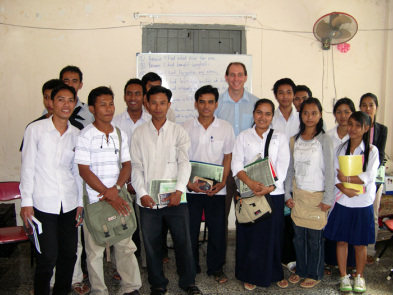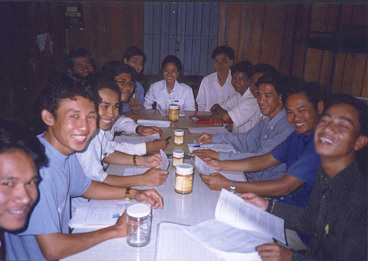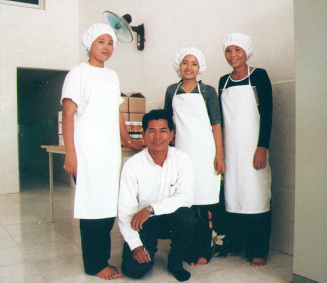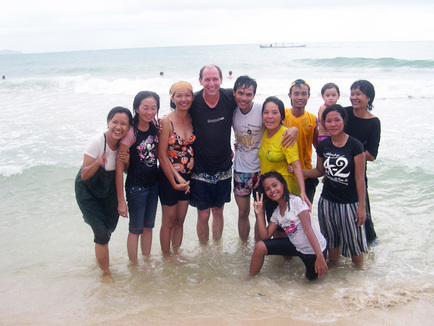Meet the founders of Healthland

Healthland was started in 1998 by a group of young, ambitions Cambodian students along with a team of other staff and a volunteer from Australia, Ross Mckenzie. It grew out of some class projects assigned to students by Ross who was teaching English and other classes as a volunteer with his church. He was paid a $150 stipend to live on and was provided a small budget to develop a project for university students.
Students were hungering to learn English so Ross rented a small house near the Royal University of Phnom Penh and began teaching, charging only a small fee to cover the costs. He discovered that students were interested in learning about other topics so he started a management class as well. Students had to think of worthwhile projects to develop and manage in teams. One of the projects was a ‘Clean Cambodia Campaign’ in which students developed leaflets and banners to teach people in the community to not throw rubbish in the streets.
Students were hungering to learn English so Ross rented a small house near the Royal University of Phnom Penh and began teaching, charging only a small fee to cover the costs. He discovered that students were interested in learning about other topics so he started a management class as well. Students had to think of worthwhile projects to develop and manage in teams. One of the projects was a ‘Clean Cambodia Campaign’ in which students developed leaflets and banners to teach people in the community to not throw rubbish in the streets.

Another class project the students developed was a cottage food industry to help generate funds to pay for their course fees. The students learned how to grind up peanuts in little blenders to make peanut butter. They spent a few hours together one morning each week making peanut butter and then sold it to friends and expatriates living in Cambodia.
Ross asked for a grant from the church to buy a machine, purchase packaging and design labels. Students began preparing documents to register a new organisation: the Healthland Training Centre. It was not long before Healthland peanut butter was being sold on the shelves of shops in Phnom Penh.
Ross asked for a grant from the church to buy a machine, purchase packaging and design labels. Students began preparing documents to register a new organisation: the Healthland Training Centre. It was not long before Healthland peanut butter was being sold on the shelves of shops in Phnom Penh.

Several months later a Cambodian widow came to Ross asking for work for herself and her daughter. Her late husband, who was an engineer, was killed during Pol Pot time. Her daughter was escaping with her two young children from an abusive relationship. Ross said he had no work to offer them but they kept pleading so he gave them a job. The peanut butter industry was tiny and could not pay for two full time salaries but Ross felt sorry for them and decided to use his stipend to pay for their salary. It turned out to be a blessing. Ross and his students got together and discussed ideas to grow the industry so that it could provide more jobs.
Unfortunately, the industry was unable to get more grants from the church to grow and develop so it went through many years of struggles. But with income from sales, English classes and some small donations the industry was able to gradually grow. Ross trained staff to manage the industry with a strong emphasis on food safety, quality control and research and development. Many students worked part-time in the industry while studying at university. It provided good work experience as well as income for their studies. Ross left Cambodia in 2009 and others have managed the industry. Click success stories to see where some of the original students are now.
Unfortunately, the industry was unable to get more grants from the church to grow and develop so it went through many years of struggles. But with income from sales, English classes and some small donations the industry was able to gradually grow. Ross trained staff to manage the industry with a strong emphasis on food safety, quality control and research and development. Many students worked part-time in the industry while studying at university. It provided good work experience as well as income for their studies. Ross left Cambodia in 2009 and others have managed the industry. Click success stories to see where some of the original students are now.

Ross McKenzie writes:
Ever since I was a little boy I dreamed of going to another country to help people. But I didn't see myself as a stereotypical missionary or aid worker, dependent on a church or aid organisation to fund my activities. I wanted to go overseas to live and work with the people and make friends with them.
In 1998 I decided to go to Cambodia for one year as a church volunteer and that started me on the path towards the work I am doing now. My dad had always taught me the value of hard work, of learning skills I could be proud of and experiencing the satisfaction of completing tasks he set for me.
I saw that hand-outs and donations were not achieving much and did not give people a sense of pride or accomplishment. Instead they robbed people of dignity and killed enterprise and initiative. I decided to adopt another philosophy - one that would help people to help themselves.
I spent 10 years in Cambodia and in that time I worked with other enterprising Cambodians to establish a food industry (Vissot) and a training and support program for young people. I married Kamrang Un, a Cambodian doctor, and we have two beautiful daughters. I am now living in Australia and completing a medical degree at Newcastle University, with the aim of going back to Cambodia and continuing the projects I was involved with.
We have the opportunity while on this planet to live and work with people, to teach them how to take care of themselves and to give them something better to hope for. When my life is nearing its end I don't want to be as Schindler at the end of the war and regret with tears that I hadn't sold my gold ring to save another life.
Please explore this website further to see how you can help support our dreams for Cambodia.
Ever since I was a little boy I dreamed of going to another country to help people. But I didn't see myself as a stereotypical missionary or aid worker, dependent on a church or aid organisation to fund my activities. I wanted to go overseas to live and work with the people and make friends with them.
In 1998 I decided to go to Cambodia for one year as a church volunteer and that started me on the path towards the work I am doing now. My dad had always taught me the value of hard work, of learning skills I could be proud of and experiencing the satisfaction of completing tasks he set for me.
I saw that hand-outs and donations were not achieving much and did not give people a sense of pride or accomplishment. Instead they robbed people of dignity and killed enterprise and initiative. I decided to adopt another philosophy - one that would help people to help themselves.
I spent 10 years in Cambodia and in that time I worked with other enterprising Cambodians to establish a food industry (Vissot) and a training and support program for young people. I married Kamrang Un, a Cambodian doctor, and we have two beautiful daughters. I am now living in Australia and completing a medical degree at Newcastle University, with the aim of going back to Cambodia and continuing the projects I was involved with.
We have the opportunity while on this planet to live and work with people, to teach them how to take care of themselves and to give them something better to hope for. When my life is nearing its end I don't want to be as Schindler at the end of the war and regret with tears that I hadn't sold my gold ring to save another life.
Please explore this website further to see how you can help support our dreams for Cambodia.

